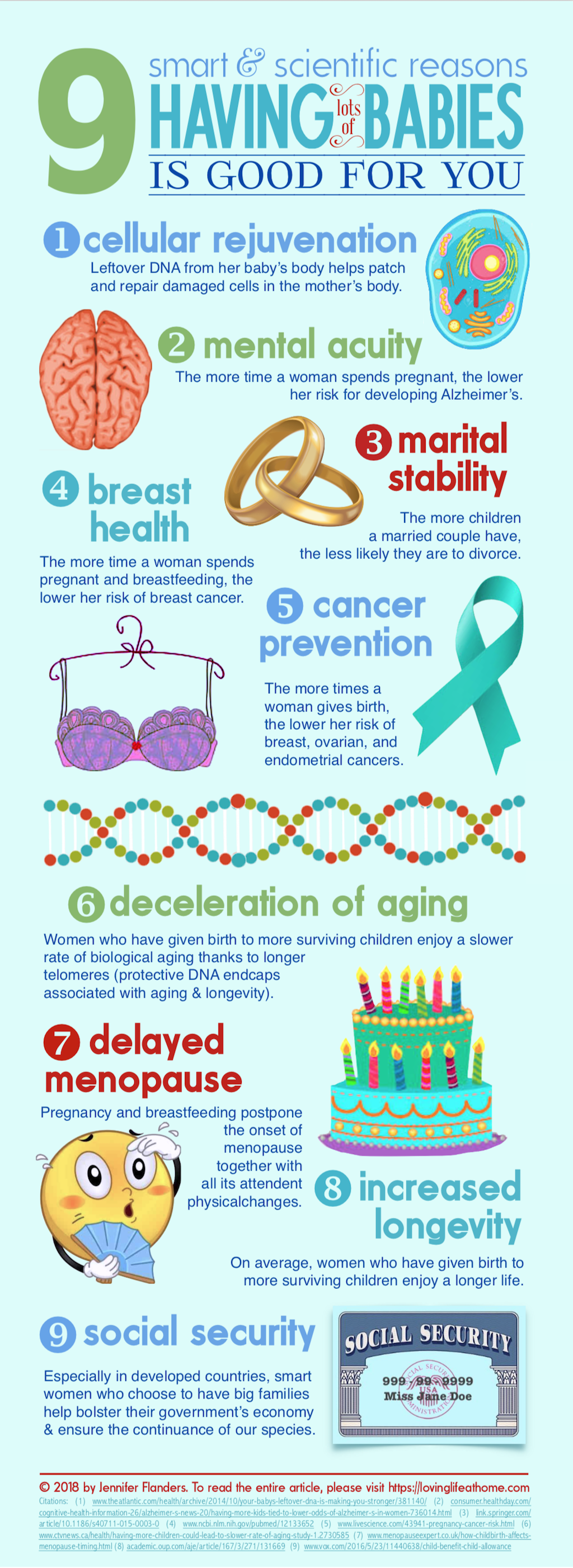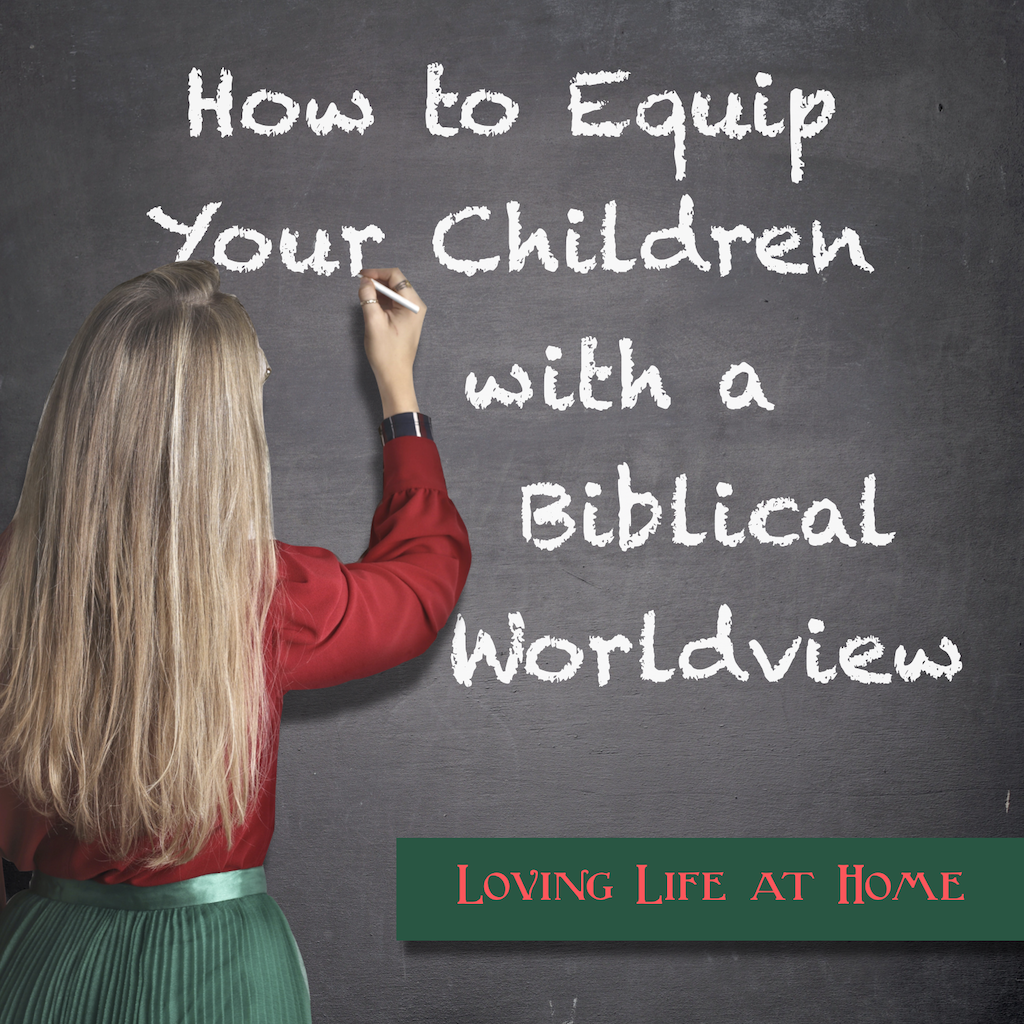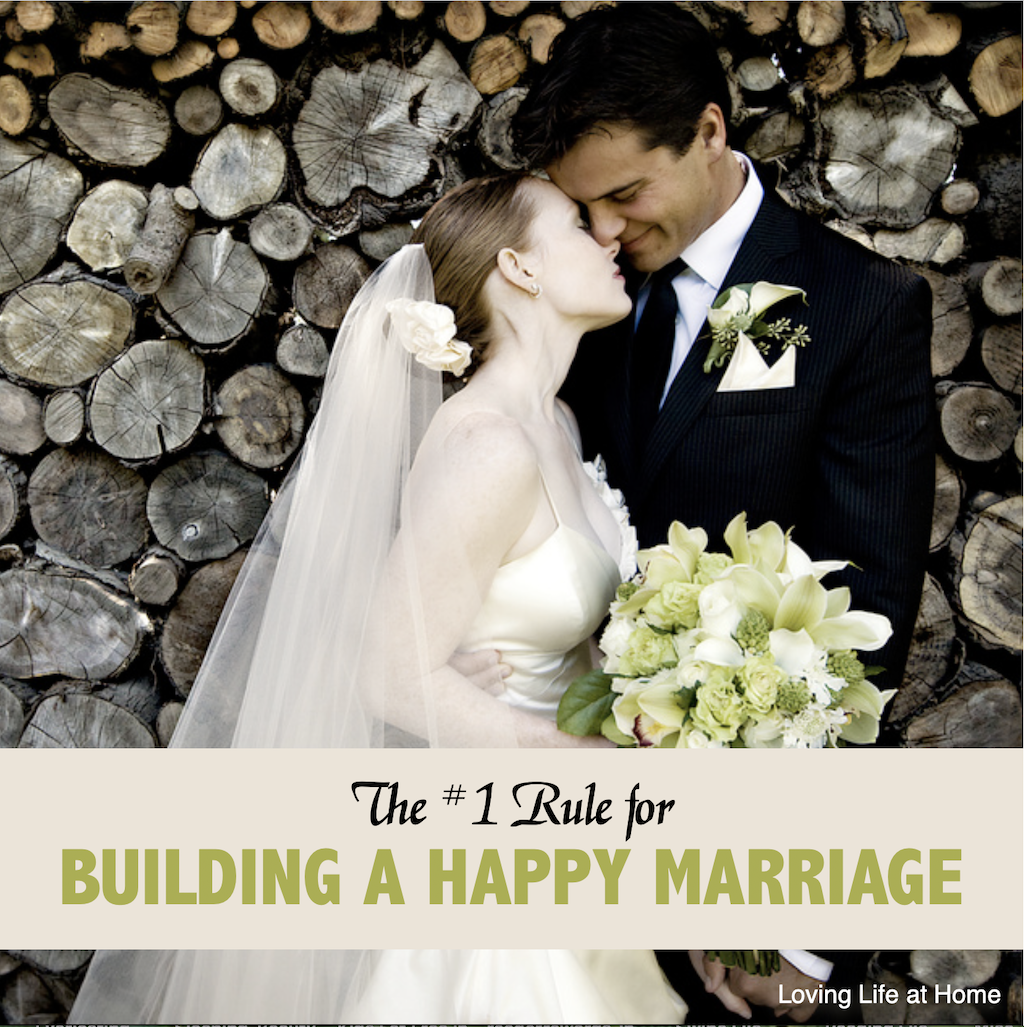EP 8: Scientific Proof Having Babies is Good for You

The Bible tells us children are a blessing. That means, of course, that the babies themselves are a blessing. But thanks to some recent scientific studies, we also now realize that the process of having babies is good for you, too.
That should really come as no surprise to believers. Packing his blessing full of richer and deeper and broader benefits than a human brain can fathom is God’s modus operandi. But it’s fun when secular research gives us a brief glimpse at how marvelous and far-reaching His design truly is.
Sadly we live in a culture that ignores any science that doesn’t support the accepted narrative. And right now that narrative would have us believe that children are a burden and a drain on our environment and that enlightened folk will purposely limit family size — or possibly forgo having children altogether — in an attempt to help save the planet.
So, if these studies are new to you, that may be why. Modern society is still pushing the idea that birthing a big family is backward. They don’t want you to know that having babies is actually one of the smartest things a woman can do.
Show Notes
SCRIPTURES CITED:
- “Behold, children are a gift of the LORD, the fruit of the womb is a reward. Like arrows in the hand of a warrior, so are the children of one’s youth. Blessed is the man whose quiver is full of them; they will not be ashamed when they speak with their enemies in the gate.” – Psalm 127:3-5
RELATED LINKS:
- 15 Unexpected Benefits of Big Family Living
- #postcardsformacron on Twitter
- Your Baby’s Leftover DNA is Making You Stronger
- Having More Kids Tied to Lower Risk of Alzheimers in Women
- The Impact of Children on Divorce Risk
- Breast Cancer and Breastfeeding
- Oh Baby: Giving Birth 10 Times May Reduce Mom’s Cancer Rish
- Having more babies could lead to slowr rate of aging: study
- Reproductive History and Mortality in Late Middle Age among Norwegian Men and Women
- Sweden pays parents for having kids — and it reaps huge benefits. Why doesn’t the US?

9 Science-Backed Benefits to Birthing a Big Family
French President Emmanuel Macron has come under criticism lately for his remarks on fertility and childbirth.
“Present me the woman who decided, being perfectly educated, to have seven, eight or nine children,” Macron challenged, implying that no woman in her right mind would choose to have so many.
I don’t believe the President of France was intentionally trying to slight smart mothers of large families; I think rather he is prejudiced and ill-informed.
Presiding as he does over a first-world country where the average household size is only 2.3 people, Macron may assume families with upwards of four or five times that many members are backward or benighted.

That is simply untrue.
Thanks to #postcardsforMacron, though, he has now learned that highly-educated women with mega-sized families do exist.
Those Instagram posts have beautifully demonstrated an important point: Many smart women consciously choose to have a lot of children. I’d like to take the conversation one step further and show that having a lot of children is one of the best choices a smart woman can make.
I’ve written before about the unexpected blessings of big-family living. Today, let’s discuss the scientific advantages to having many times the average number of children.
Note: To view a summary of the following information in infographic form, please scroll to the bottom of this post.
Cellular Rejuvenation
A woman’s body changes in significant ways each time she carries a baby, and I’m not just talking about her bulging belly. Thanks to a process called microchimerism, being pregnant actually leads to the repair of damaged tissues in mother’s bodies on a cellular level. That’s like having a full-body makeover — from the inside out — every time you’re expecting!
Mental Acuity
Birthing lots of babies has been linked with a lower maternal incidence of dementia. While the relationship may not be causal in nature, studies suggest that women who spend more of their lives pregnant are less likely to develop Alzheimer’s (researchers have noted a 5.5% decrease in risk per month of pregnancy).
Marital Stability
Having a large family is protective of your marriage. Statistically speaking, the greater the number of children, the lower the risk of divorce. Not only is the presence of young children in the home one of the strongest predictors of marital stability, but sociologists tell us that the older a couple is when their last child leaves home, the better chance their marriage will survive.
[To view the scientific advantages to prioritizing sex in marriage, follow this link.]
Breast Health
While hormonal contraceptive use and abortion increases a woman’s risk for breast cancer, having babies — and breastfeeding them — lowers the incidence significantly. Researchers report that for every year a woman spends breastfeeding, her risk of breast cancer drops by 4.3%. (After having nursed a dozen babies for nearly two years apiece, my own chance of getting breast cancer is virtually non-existent.)
[To view more health risks associated with hormonal contraceptive use, click here.]
Cancer Prevention
In addition to decreased incidence of breast cancer, studies have shown that “women who breastfeed multiple children for a combined total of 31 months or more reduce their risk of ovarian cancer by 91%.” Pregnancy is protective, too: Research suggests that women who give birth to 10 or more children enjoy a reduced risk of ovarian and endometrial cancers, as well.
[To read 10 things to do while breastfeeding, follow this link.]
Deceleration of Aging
The number of children a woman bears slows down the rate at which her body ages. According to researchers, the more surviving children she births, the longer her telomeres (the protective endcaps on DNA strands associated with aging). Whether or not her apparent age is affected, bearing children does benefit a mother’s biological age.
Delayed Menopause
Both pregnancy and breastfeeding can prevent ovulation, leading to a greater stock of follicles later in life and affecting the timing of menopause. The more pregnancies a woman sustains and the more babies she breastfeeds, the longer the onset of menopause (and all its attendant changes and challenges) may be delayed.
Increased Longevity
Multiple studies have shown that married women who have three, four, or five or more children enjoy a significantly lower mortality rate than those with two or fewer. In other words, having more children is associated with living a longer life. “In no instance was higher parity significantly associated with higher mortality risk.”
Social Security
Decreased fertility and dwindling birthrates portend deeply troubling problems for societies world-wide, including labor shortages, top-heavy populations, and economic collapse. That’s why countries like Germany, Austria, Denmark, Sweden, and even France have begun paying couples to procreate. Smart women who choose to have a lot of children are simply ahead of that curve.
Maybe President Macron regrets making hasty and unwarranted assumptions about the educational credentials of mothers with large families. Perhaps he remains unconvinced and still believes we must have a loose screw to willingly do what we do.
Personally, I’m grateful for Macron’s overgeneralizing remark — or, at least, I’m glad for the public response to it. I love the fact that the vast majority of mothers who took issue with the President’s comment did so in such a gracious and respectful way.
[For tips on responding positively to negative comments on family size, click here.]
It has been fun to scroll through the pictures of all their huge and happy families. And I’ve been encouraged to glimpse a sampling of all the brilliant women out there who’ve chosen to devote their time, talents, and energy to raising the next generation. Well done, Mamas. Keep up the good work!







It doesn’t come across very well. So far, women who have remained virgins well into old age, so no husband or children, on mothers day have to clap for the single mothers with several children by several different men. Now they have to accept they will die young, and get cancer. Not to mention women who are married with children but can’t breast feed and women who have had several miscarriages but no children. I’m not surprised to hear that unmarried women are leaving churches in high numbers.
I’m sorry, Heather. I know that doesn’t seem fair. But we can glorify God and acknowledge His incredible design, even when we do not personally get to enjoy the full blessings and benefits of that design in a given area. I have three beloved sons with Type 1 diabetes. That puts them at risk for all sorts of horrible things, including blindness, kidney failure, and neuropathy. But I don’t let that fact keep me from appreciating the marvelous way God created the human pancreas and endocrine system to function. It is truly amazing! Furthermore, instead of fretting over all the negative possibilities the future may hold, I pray that God will have mercy on my children who are affected by this lifelong disease, I rejoice over each day we have with them, and I thank and praise Him for the good overall health all three have enjoyed, despite being insulin dependent for so many years.
Thank you for sharing ❤️ I currently have a 10 year old son & his prayer is for more siblings. This post encourages me to keep seeking God inspite of my 2 miscarriages, I believe He will bless me with more children. One day I hope to take a beautiful picture of my entire family like yours & see the blessing of having a spiritual legacy.
Bless you Sis?
God is faithful, Alondra. I pray He will give you the desires of your heart as you continue to delight yourself in Him. (Psalm 37:4-5)
CHALLENGE ACCEPTED!!!!
My sentiments, exactly!
Do you happen to have statistics on educational levels of women compared to their number of children? I would be interested to see those numbers because so far, women with bachelor’s level education and having 9+ children seem to be exceptions rather than the norm. Personally, no I would not want that many children for the sake of my mental health, an Andrea Yeates situation might happen when I think if possible having 4 or mire children.
I definitely think you’re right about women with Bachelor’s degrees and 9+ children being the exception rather than the rule. I did look up the actual statistics for you, though.
As expected, mothers with a greater than average number of children tend to have a lower than average educational background. However, the article does note that this “educational ‘gap’ in fertility has narrowed in the past two decades, driven in part by increases in family size among the highly educated” — meaning many women with a master’s level degree or higher have lately been opting for larger families. That’s hopeful, I think, and is in keeping with the “Postcards for Macron” conversation cited above.
To view these statistics yourself, just follow this link.